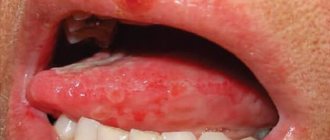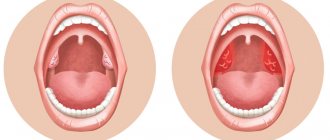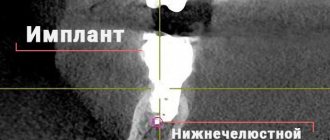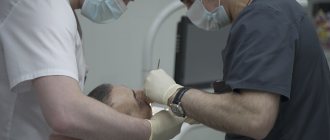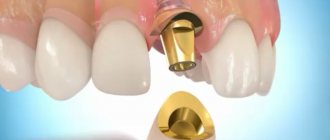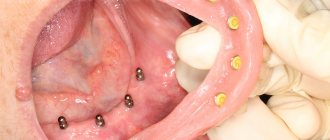Mucositis and peri-implantitis are periodontal diseases in the area of dental implants. In their manifestations, these diseases are very similar to periodontal diseases in the dental area, such as gingivitis and periodontitis, which is clearly visible in the illustrations above, but, due to the structural features of the soft tissues around the implant, mucositis and peri-implantitis differ from gingivitis and periodontitis in the nature of the course of the disease, therefore, a different treatment tactic is chosen.
Mucositis is inflammation of the mucous membrane in the area of a dental implant without signs of bone loss (clinical signs similar to gingivitis).
| Gingivitis | Mucositis |
Peri-implantitis is an inflammatory disease of soft tissue in the implant area, accompanied by bone resorption (loss) (clinical signs similar to periodontitis).
| Periodontitis | Peri-implantitis |
The disease is determined during a follow-up examination at the dentist using probing of the gum pockets and x-rays.
Features of peri-implantitis
The course of the inflammatory process with peri-implantitis is more severe. The peculiarity of peri-implantitis is that the area of inflammation is not separated from the bone by a zone of connective tissue, as in periodontitis (as can be seen in the figure above), but is in contact with the bone. In periodontitis, the gum pocket has a layer that separates it from the bone, so the bone tissue is separated from microbes. With peri-implantitis there is no such layer. The degree of bone resorption (bone loss) can be assessed using a control x-ray taken after the installation of dentures.
Causes of pus
Firstly, if you detect pus or discharge from the gums, you should immediately consult a doctor, as this is a direct signal that implant rejection has begun.
If this is not done, even greater complications may arise, which can lead to the structure falling out. Table 1. Causes of pus
| Causes | Peculiarities |
| Improper hygiene | Food particles or bacteria getting under the implant is the main reason for the appearance of purulent discharge. Therefore, after surgery, it is important to follow doctor’s instructions and carefully care for your oral cavity. This is not only about brushing your teeth twice a day, but also about professional hygiene. By the way, it is recommended to add special brushes or an irrigator to your home care. You can ask your hygienist about how to properly care for your implant. For example, our clinic offers a free hygiene lesson to everyone. |
| Individual characteristics of the body | Before surgery, the doctor always collects anamnesis and excludes contraindications for implantation. But it is difficult to predict how the body will react to a foreign body. If a patient experiences implant rejection due to an allergy to metal, then alternative methods of dental restoration should be chosen. |
| Doctor's mistakes |
|
| Patient errors | Violation of postoperative recommendations:
|
Treatment of peri-implantitis
If you have dental implants installed and there are signs of gum inflammation, do not use traditional treatment methods or advice from friends. Contact a specialist for advice. Treatment of peri-implantitis should be aimed, first of all, at eliminating the infectious process in the tissues around the implant, closing the gum pocket, stopping bleeding and preventing further bone loss. If necessary, the bone level is restored using bone grafting.
The first stage of treatment for reimplantitis is professional hygiene, during which soft and hard dental plaque is removed from the implant, dentures and teeth. Ultrasonic cleaning devices are used to remove subgingival plaque, which do not damage the implant, abutment, crowns and surrounding tissue.
When treating re-implantitis, surgical intervention may be required - opening the gum area in the area of the implant, which gives the doctor the opportunity to see the surface of the implant for more thorough cleaning, as well as bone grafting in case of bone resorption (loss).
Family Dentistry has experienced periodontists who can help with periodontal disease. Treatment is carried out using the most advanced methods using modern equipment. Periodontist surgeon I.I. Yakimenko uses a dental laser, which makes surgery painless and bloodless. Periodontist Kolesnikova N.A. uses a dental laser to sterilize periodontal pockets and speed up tissue restoration. Our doctors’ extensive experience of successful work helps us cope with any, even very complex cases.
Mucositis – what is it?
Mucositis is an inflammation of the tissues of the oral cavity and throat mucosa. The main reasons are a weakened immune system caused by various conditions or chemotherapy, implant rejection, which causes inflammation of the soft tissue. Possible ulceration.
Peri-implant mucositis is a lesion of the gum tissue surrounding the implant. The tissues swell and bleed when pressed. This inflammation of the mucous membrane is characterized by clinical signs close to gingivitis, there is no bone loss.
Mucositis and peri-implantitis are similar in symptoms and course to classic periodontal diseases with natural dentition. The first disease is characterized by inflammation of soft tissues, the second is additionally accompanied by resorption (progressive loss) of bone mass.
Prevention of peri-implantitis and mucositis
To prevent periodontal diseases after treatment for reimplantitis or mucositis, it is necessary to continue careful hygiene, using products selected by the hygienist and following the rules of self-hygiene after dental implantation, not skip check-ups with the dentist and undergo professional cleaning of teeth, dental implants and dentures according to the schedule prescribed by the doctor.
Other related articles:
- Features of the tissues around the dental implant
- Observation by a doctor after dental implantation
- Self-hygiene after dental implantation
- Professional hygiene after dental implantation
Make an appointment with periodontists, hygienists, for professional teeth cleaning or dentures by calling +7-499-110-18-04 or through the form on the website. You can ask questions to the chief physician of the clinic, Sergei Vladimirovich Tsukor, on his page on
Mucositis – the best of the worst
Mucositis after implantation is also a common problem, although not as serious as peri-implantitis. This is the initial stage of implant rejection, when only soft tissues become inflamed and the bone is not affected.
How does mucositis manifest:
- erythema - redness;
- thinning of the mucosa at the site of inflammation;
- hyperplasia - swelling of the gums;
- ulcers on the inside of the cheeks and gums;
- white spots on the mucous membrane are a symptom of the death of soft tissue.
Painful sensations while eating, increased body temperature, malaise, dry mouth, and weight loss also accompany dental mucositis. The disease rarely leads to the loss of an implant, but the danger is different: with advanced mucositis, the mucous membrane in the mouth is so inflamed that the patient cannot even swallow, nutrition is only possible through a tube.
Diagnostics
Determining the presence of the fistula itself is not difficult. To assess its depth and diameter, it is possible to use a special probe inserted into the resulting oroantral tract. To assess the extent of inflammation and the presence of additional passages, it is possible to use radiography of the upper jaw with the introduction of a contrast agent.
Evaluation of the presence of a foreign body or apex of the tooth root is carried out during radiography or directly during the operation to close the fistula. If there is no effect from antibacterial therapy, it is possible to culture the microflora to determine its resistance to antibiotics of various types of action.
What is the danger of a fistula near an implant?
The fistula tract itself is not dangerous; to some extent, it even helps to temporarily stop the growth of the cavity with pus, since excess accumulated exudate comes out through it. However, its appearance indicates extensive purulent inflammation. It cannot be limited to a local cavity for a long time and will spread further. This can lead, in addition to damage to soft tissues, to destruction of the jaw bone. In the future, a fistula during tooth implantation can lead to serious complications:
- extensive inflammation of the periosteum,
- mobility of living units and installed implants,
- complete loss of teeth and loss of artificial structures,
- growth of the inflammation focus into nearby structures: inner ear, sinuses,
- the appearance of multiple cysts in the jaw,
- sepsis - infection of the blood and lymph,
- multiple organ failure: damage to internal organs due to sepsis.
Read more about the most dangerous complication after implantation in the material “Dental implant rejection.”
Problems after implantation - what you shouldn’t be afraid of
After any surgical intervention, the body needs time to recover. A reaction to surgery may (but does not necessarily) include the following symptoms:
- Pain
in the jaw after the anesthesia wears off.
They disappear in 2-3 days
, maximum
in a week
, gradually weakening. - Moderate bleeding 2-3 hours
after surgery. Sometimes, saliva may be pink for 2-3 days, but there is no bleeding as such. - Edema
. They may increase during the first 3 days after surgery, but then subside. - Temperature increase
.
For 2-3 days,
the temperature can rise to
37.3
degrees, but overall health remains normal. - Loss of sensation
. Recovers on its own in a short period of time.
Symptoms of the disease
Some of the first manifestations of a fistula may be pain in the operated area when tilting and turning the head, a feeling of loosening of the implant, and an increase in temperature to 37.0 - 37.5 ° C.
The rate of progression of the disease is individual; over time, the denture may fall out (during its installation) or a hole may directly appear in the alveolar process. At this stage, there may be discharge of pus and mucus from the fistula, and a sensation of air vibrations in the oral cavity during breathing. When microorganisms or pieces of food enter the maxillary sinus, sinusitis develops, which aggravates the patient’s general condition. There may be a feeling of “softness” of the palate and alveolar process. If the fistula tract is 1 - 3 mm in diameter, then all kinds of discharge may be absent.
Eating becomes difficult due to severe pain. When coughing or sneezing, mucus may be thrown into the oral cavity, and there may be a sensation of air moving from the fistula.
One of the common signs of the oroantral tract is the development of odontogenic sinusitis. This disease can lead the patient to an otolaryngologist, directing the diagnostic algorithm and treatment in the wrong direction. This type of sinusitis is characterized by a long course with no response to treatment and antibiotics used. Puncture of the maxillary cave will also not have the desired effect.
What to do to prevent complications after implantation
To begin with, you should carefully choose the clinic where the implantation will be performed. Dentistry must have modern equipment and work with high-quality, proven dental systems, the manufacturers of which do not raise the slightest doubt. Doctors in the clinic must have the necessary skills, knowledge and experience. When choosing a dentist and implantologist, you should carefully study the reviews of real patients of the clinic.
For preventive purposes, you must visit the dentist at least every six months. If any discomfort or symptoms of the development of pathological processes occur, a visit to the dentist should be immediate.
After implantation, you should stop drinking alcohol, smoking, and avoid any mechanical damage to the gums, cheeks and jawbone. After implantation and a year after the operation, an x-ray should be taken, this will allow timely detection of jaw atrophy.
You need to brush your teeth twice a day, and you shouldn’t limit yourself to a regular toothbrush. To clean the oral cavity, dentists recommend using an irrigator, whose operating principle is to remove food debris and bacteria from the interdental spaces and periodontal folds using strong water pressure. Electric, ultrasonic and ionic toothbrushes will help to effectively clean the oral cavity.
Compliance with these recommendations minimizes the risk of complications after implantation surgery.
How to identify postoperative complications? Characteristic symptoms of implant rejection
The first thing to know about implant failure is that it does not necessarily start immediately after surgery. It may take months or even years after the implantation of a denture before the first symptoms of rejection appear. However, the first signs that the implant is not taking root may appear during the healing period, which can greatly complicate the diagnosis.
The following symptoms indicate problems with implant healing:
- swelling of the gums and swelling at the site of implantation (may appear during the healing period even if implantation is successful);
- inflammatory process in the gum, change in its color, unpleasant odor from the installation site;
- bleeding at the implant site (possible in the first few days after successful implantation);
- discharge of pus from the gums at the implantation site;
- strong pain.
As you can see, some of the symptoms are characteristic of the normal course of the postoperative period. Therefore, in order not to miss the onset of inflammatory processes and not to start the rejection process, it is important to inform the doctor about all changes in the condition in the postoperative period.
What is a fistula or fistula?
Using medical terminology, a fistula is called a fistula (from the Latin fistula - “tube”). It is a channel formed by epithelial or granulation tissue that connects the pathological cavity with the external environment or with another cavity. A pathological cavity inside soft tissue or bone, in turn, is formed due to the development of prolonged purulent inflammation and the formation of a purulent focus. Pus occurs as a result of tissue breakdown and, accumulating over time, seeks a way out of the cavity. If the inflammatory process is not eliminated and continues, then the passage through which the pus came out does not heal, but forms a purulent fistula - a pathological opening.
Fistula is sometimes confused with gumboil (periostitis). You can find out how flux differs from the article on our website “Treatment of teeth and oral cavity before implantation.”
In the oral cavity, the appearance of a fistulous tract is possible on the gums in the area of the roots of the teeth, both on the upper and lower jaw. It looks like a rounded lump, a bright red bump with a whitish tip. The diameter of the formation, as a rule, does not exceed 1 centimeter. The tooth near which a fistula forms is usually diseased (deep caries, pulpitis, periodontitis) or poorly treated (inflammation developed under a filling in the canals, occurred at the apex of the root). Also, a fistula can form on the gum near the implant as a consequence of the development of the inflammatory process.
It is important to remember that the release of purulent contents is possible not only into the oral cavity, but also into internal tissues and organs. This is very dangerous, as it leads to infection of healthy areas, infection can penetrate the circulatory and lymphatic systems. The situation is aggravated by the proximity of an extensive network of submandibular and cervical lymph nodes.
